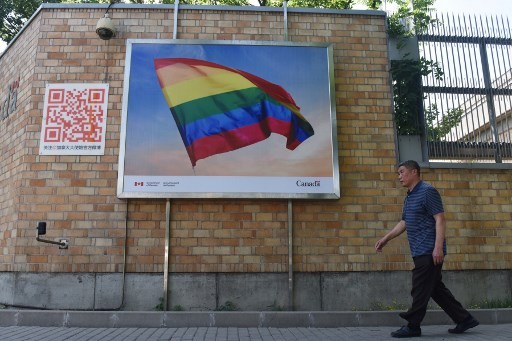Popular Reads
Top Results
Can't find what you're looking for?
View all search resultsPopular Reads
Top Results
Can't find what you're looking for?
View all search resultsLGBT groups banned from organizing around the world, says report
Change text size
Gift Premium Articles
to Anyone
 In this photo taken on May 18, 2018 a man walks past a poster of a rainbow flag outside the Canadian embassy in Beijing. China's LGBT community may not get much support from authorities, but in a sign of growing tolerance in Chinese society, people are using the power of hashtag campaigns to denounce attacks on gays and lesbians.
(AFP/Greg Baker)
In this photo taken on May 18, 2018 a man walks past a poster of a rainbow flag outside the Canadian embassy in Beijing. China's LGBT community may not get much support from authorities, but in a sign of growing tolerance in Chinese society, people are using the power of hashtag campaigns to denounce attacks on gays and lesbians.
(AFP/Greg Baker)
J
ust 56 percent of the world's countries allow LGBT groups to organise without the threat of arrest or state harassment, further marginalising gay organisations from mainstream society, according to a report published on Tuesday.
The LGBT rights group OutRight Action International analysed 194 countries and found that only 109 allow gay, lesbian, bisexual or transgender groups to register legally.
In 55 countries, including Russia and Lebanon, gay organisations exist, but state authorisation is denied. Others, such as Malaysia, ban LGBT groups outright.
"This is a way of hindering and trying to stop any kind of progress or push for equality that LGBT groups want to do," Maria Sjödin, deputy executive director of OutRight, told the Thomson Reuters Foundation.
"I truly believe that change in society happens because people organise and push for it. That is how greater equality for LGBT people has been achieved."
The survey found that in 30 countries, including Afghanistan, Turkmenistan and Somalia, it was impossible to find any officially registered LGBT organisations at all.
Denying citizens the right to organise is a "way for governments to make it so hard that I guess they hope that people will just give up," Sjödin added.
Governments employ both religious and moral reasons for curtailing civil society organisations, the report noted, with groups banned for being against the "national interest".
In countries such as Nigeria, homosexuality is illegal, making the process of applying even more problematic.
"Without the registration there are lots of things you cannot do," said Jean Chong, co-founder of Sayoni, an LGBT rights organisation based in Singapore.
"It is impossible to get an office space and you cannot ask for donations publicly as you are not a legal entity."
Registration is formally possible in Singapore, but the report noted that attempts by civil society groups to apply for authorisation are frequently blocked.
Budding gay activists instead register under more generic umbrella titles, such as women's or human rights groups, Chong said. But the consequences for countries that outlaw civil society groups altogether could be harsh, she added.
"We are talking about suicide, depression and substance abuse – and violence. It's always there, but just not seen and not in the public eye," she said.
"When groups cannot register they cannot effectively raise funds, so it limits their ability to do things like research and collect data and do substantive advocacy around these issues."









